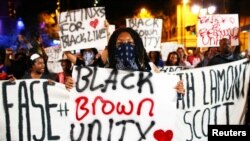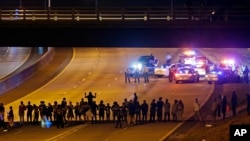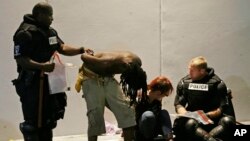As presidential candidates Hillary Clinton and Donald Trump on Monday addressed the issue of race relations during a televised presidential debate that was watched by millions of viewers, the issue was also being hotly debated at a tense city council meeting attended by hundreds of citizens in the embattled southeastern U.S. city of Charlotte, North Carolina.
An irate crowd of citizens gathered late Monday at the Charlotte-Mecklenburg Government Center for the first city council meeting since the fatal police shooting of Keith Lamont Scott and the subsequent series of nightly protests that sometimes turned violent.
The shooting was another example of what some people believe is a nationwide pattern of police using excessive force against African Americans. It was the beginning of a period of unrest that has since permeated the city.
Of the more than 40 people who signed up to speak about the city’s handling of the Scott shooting, was 10-year-old Zianna Oliphant. She said her reason for coming was to tell city leaders and police what it’s like to be an African American.
“I’ve come here today to talk about how I feel, and I feel like that we are treated differently than other people,” she said. “I don’t like how we are treated. Just because of our color,” she added before bowing her head and breaking down in tears.
“We shouldn’t have to protest because y’all are treating us wrong. We do this because we need to and have rights,” she said amid words of encouragement from the crowd.
Many at the emotionally charged meeting called for the resignations of city leaders, including Mayor Jennifer Roberts and Police Chief Kerr Putney, who have been roundly criticized for waiting days to release police video of the shooting, fueling the discontent in the community.
“I’m here to ask for Chief Putney’s and your resignation, mayor,” said speaker Henry Lee. “The way it was handled, the secrecy, the lies. We don’t deserve this. People are losing their lives, and you are backing these people with these policies. You don’t deserve to be mayor of this fine city. You are on the verge of bringing this fine city to its knees. Step down.”
Call for federal investigation
After the meeting, some protesters gathered in the lobby of the Government Center and demanded a federal investigation into the Scott shooting.
Mayor Roberts, who has said the delayed release of the police video “was not acceptable,” said she has asked the U.S. Justice Department to monitor the state’s investigation into the killing.
While the Scott shooting is investigated by local and state officials, it also refocuses the national spotlight on race relations in the country. During the presidential debate, many observers believe Clinton bested Trump on the issue of race.
In one exchange, Clinton pummeled Trump for promoting what she described as a “racist lie” that President Barack Obama not born in the United States. Trump responded by incorrectly blaming Clinton for starting the controversy when she ran against Obama in 2008.
In the middle of the debate, moderator Lester Holt asked the candidates how they would improve race relations in the U.S. Trump missed an opportunity to repair his image among minorities by reiterating he is the “law and order” candidate” who would expand the controversial stop and frisk policies once widely used by one of his political advisors, former New York Mayor Richard Giuliani.
Stop and frisk, which allowed police to search citizens for drugs or weapons, was ruled unconstitutional for targeting minorities.
Holt gave Trump another opportunity to appeal to minority voters by asking him a follow up question about why it took him years to change his mind about Obama’s birthplace, a position many people, particularly African Americans, thought showed disrespect to the president. But Trump interrupted and said, “Well, it was very, I say nothing. I say nothing because I was able to get him to produce it. He should have produced it a long time before. I say nothing.”
A New York Times/CBC News poll conducted in September showed that nearly 85 percent of African American voters support Trump’s opponent, Hillary Clinton. A recent survey done by Public Policy Polling found that only 13 percent of Latino and African American voters believe that Trump is interested in them.







